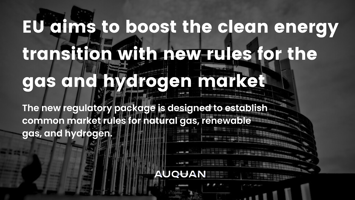New York Governor Kathy Hochul unveiled the largest climate investment ever by dedicating $1...
.png?height=200&name=News%20Cover%20(90).png)
On June 17, 2024, the European Union (EU) members voted to approve the Nature Restoration Law after a group of 11 countries made a last-minute swing to vote in its favor. This law aims to protect and restore natural ecosystems and create a mandated target for EU countries.
The law is expected to create new investment opportunities for private equity and private credit firms to invest in restoration projects, ecosystem services, nature-based solutions, and companies that act as suppliers or implementation managers. The finance industry has recognized the potential for this law to catalyze hundreds of millions of Euros in private financing.
Let’s explore the Nature Restoration Law in detail.
The Nature Restoration Law, proposed on June 22, 2022, is a landmark legislation approved by the European Union that was made to restore damaged ecosystems across the EU. The law is built to contribute to the long-term recovery of damaged nature across the EU’s land and sea areas to achieve the EU biodiversity and climate objectives.
With the development in restoration, the EU plans to establish a "10 billion € natural-capital and circular economy investment initiative" building on InvestEU. The Nature Restoration Law can spur the development of new green equity, bond, and debt instruments to finance nature restoration activities, which private investors may be able to leverage or invest in.
The EU’s newly-approved Nature Restoration Law:
The law has to be formally adopted by the European Council, and it will be enforced 20 days after its publication in the EU Official Journal. Within a year of the law coming into power, the European Commission is planning to identify a range of sustainable financing measures for supporting the implementation of the law.
The Nature Restoration law presents good deal flow opportunities on restoration projects for asset managers, private credit and equity investors. Firms should be able to identify opportunities quickly in order to be in an ideal position to take advantage of them .
This presents a significant data challenge for private credit and equity firms — an area where Auquan can help.
Auquan uses advanced AI to generate material insights on any entity worldwide — public or private — and fine-tuned for your individual investment and lending workflows. Auquan sources and processes information from dozens of languages, including Mandarin.
Let’s explore how Auquan can help you and your team eliminate tedious and time-consuming manual data work and focus more on what you do best: making strategic decisions ahead of the market.
Each day we spotlight under-the-radar investment themes and idiosyncratic risks pulled from our intelligence engine, often involving emerging markets, supply chain issues, ESG risks, and the impact of regulatory changes.
.png?height=200&name=News%20Cover%20(90).png)
New York Governor Kathy Hochul unveiled the largest climate investment ever by dedicating $1...
.png?height=200&name=News%20Cover%20(5).png)
The European Union (EU) is setting up what they call the Climate City Capital Hub, an international...

The European Council (EU) has formally adopted a new regulatory package to establish common market...
Each day we spotlight under-the-radar investment themes and idiosyncratic risks pulled from our intelligence engine, often involving emerging markets, supply chain issues, ESG risks, and the impact of regulatory changes.

15 minutes to see what’s possible when manual work disappears.
Interested in working at Auquan? Click here
On June 17, 2024, the European Union (EU) members voted to approve the Nature Restoration Law after a group of 11 countries made a last-minute swing to vote in its favor. This law aims to protect and restore natural ecosystems and create a mandated target for EU countries.
The law is expected to create new investment opportunities for private equity and private credit firms to invest in restoration projects, ecosystem services, nature-based solutions, and companies that act as suppliers or implementation managers. The finance industry has recognized the potential for this law to catalyze hundreds of millions of Euros in private financing.
Let’s explore the Nature Restoration Law in detail.
The Nature Restoration Law, proposed on June 22, 2022, is a landmark legislation approved by the European Union that was made to restore damaged ecosystems across the EU. The law is built to contribute to the long-term recovery of damaged nature across the EU’s land and sea areas to achieve the EU biodiversity and climate objectives.
With the development in restoration, the EU plans to establish a "10 billion € natural-capital and circular economy investment initiative" building on InvestEU. The Nature Restoration Law can spur the development of new green equity, bond, and debt instruments to finance nature restoration activities, which private investors may be able to leverage or invest in.
The EU’s newly-approved Nature Restoration Law:
The law has to be formally adopted by the European Council, and it will be enforced 20 days after its publication in the EU Official Journal. Within a year of the law coming into power, the European Commission is planning to identify a range of sustainable financing measures for supporting the implementation of the law.
The Nature Restoration law presents good deal flow opportunities on restoration projects for asset managers, private credit and equity investors. Firms should be able to identify opportunities quickly in order to be in an ideal position to take advantage of them .
This presents a significant data challenge for private credit and equity firms — an area where Auquan can help.
Auquan uses advanced AI to generate material insights on any entity worldwide — public or private — and fine-tuned for your individual investment and lending workflows. Auquan sources and processes information from dozens of languages, including Mandarin.
Let’s explore how Auquan can help you and your team eliminate tedious and time-consuming manual data work and focus more on what you do best: making strategic decisions ahead of the market.
Each day we spotlight under-the-radar investment themes and idiosyncratic risks pulled from our intelligence engine, often involving emerging markets, supply chain issues, ESG risks, and the impact of regulatory changes.
.png?height=200&name=News%20Cover%20(90).png)
New York Governor Kathy Hochul unveiled the largest climate investment ever by dedicating $1...
.png?height=200&name=News%20Cover%20(5).png)
The European Union (EU) is setting up what they call the Climate City Capital Hub, an international...

The European Council (EU) has formally adopted a new regulatory package to establish common market...
15 minutes to see what’s possible when manual work disappears.
Interested in working at Auquan? Click here
